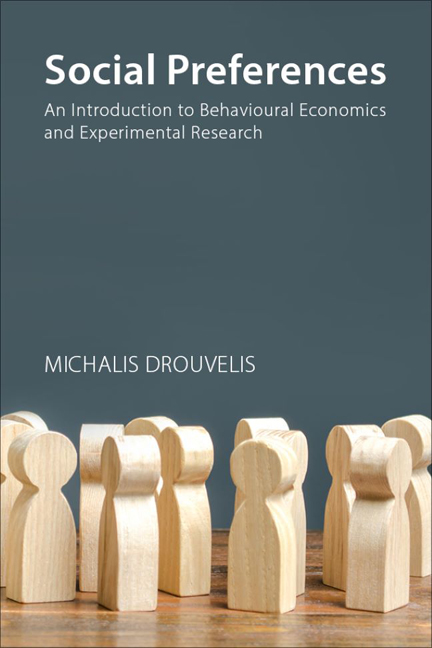Book contents
- Frontmatter
- Contents
- Preface
- 1 Introduction
- 2 Bargaining games
- 3 Trust and gift exchange games
- 4 Public Good Games I
- 5 Public Good Games II
- 6 Leadership
- 7 Public good games with sanctioning I
- 8 Public good games with sanctioning II
- 9 Cross-cultural experiments
- Appendix A Experimental instructions
- Appendix B Practical information
- Notes
- References
- Index
8 - Public good games with sanctioning II
Published online by Cambridge University Press: 22 December 2023
- Frontmatter
- Contents
- Preface
- 1 Introduction
- 2 Bargaining games
- 3 Trust and gift exchange games
- 4 Public Good Games I
- 5 Public Good Games II
- 6 Leadership
- 7 Public good games with sanctioning I
- 8 Public good games with sanctioning II
- 9 Cross-cultural experiments
- Appendix A Experimental instructions
- Appendix B Practical information
- Notes
- References
- Index
Summary
Introduction
In the previous chapter, we discussed evidence about the importance of sanctioning as a mechanism that can overcome the breakdown of cooperation and sustain high contributions. In all these experiments, a common characteristic was that the rules of the games were (randomly) determined and imposed exogenously by the experimenter. This means that the institution (i.e. public good environment) that subjects face in the experiment was not the result of their choice, a design aspect that prevents us from understanding which institution subjects would prefer to select and how they would behave in a situation where subjects can make such a choice. Part of the focus of this chapter will be on subjects’ preferences over institutions, but also on how the endogenous selection of institutions influences the evolution of cooperation and how the endogenous vs the exogenous assignments to institutions compare with each other.
Most of the extant literature implements the endogenous assignment to institutions through the use of different voting rules (e.g., ballot voting or “voting with one's feet”) resembling the real-life democratic processes that are employed when individuals decide for the introduction of a new rule. The earlier relevant literature has primarily focused on the selection of environments that offer rewards and punishments which will also be our concern for the first half of this chapter. Following this evidence, subsequent experiments have examined how people vote for different aspects of the respective institutions such as whether contributions to the private or the public account are punished, who will get punished or what the maximum level of punishment will be, among others. Broadly speaking, the main focus of this literature is on individuals’ institutional preferences as measured by their voting decisions (i.e. do individuals prefer societies characterized by sanctioning and/or rewards?) and how such decisions affect outcomes (in terms of cooperative behaviour but also efficiency/earnings). These are important questions, helping us to gain a better understanding of the behavioural determinants of human cooperation and, given the complexity of the analysis of voting processes in real-life, the application of experimental methods appears suitable (allowing us to avoid potential identification issues that may be present in the field).
- Type
- Chapter
- Information
- Social PreferencesAn Introduction to Behavioural Economics and Experimental Research, pp. 115 - 130Publisher: Agenda PublishingPrint publication year: 2021



